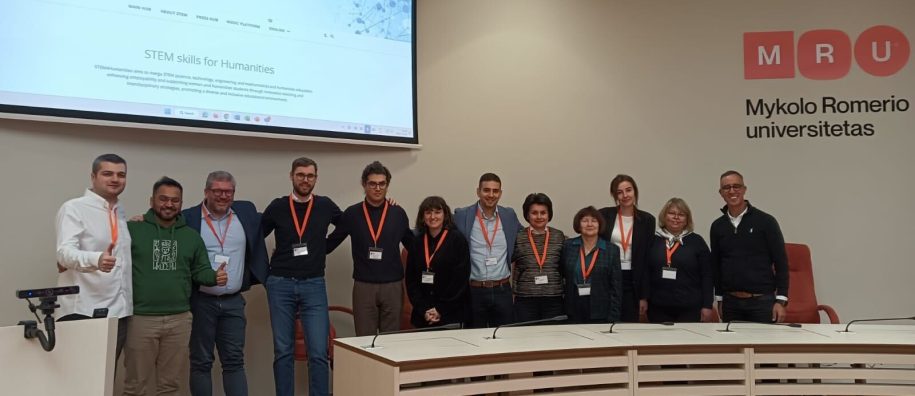
On October 20, 2025, the Institute of Humanities at Mykolas Romeris University (MRU) hosted the Final Project Meeting of the Erasmus+ project “STEM Skills for the Humanities” (STEM4Humanities). The meeting gathered representatives from partner institutions across Europe to review project outcomes, share best practices, and discuss future collaboration opportunities.
Reflecting on Three Years of Interdisciplinary Cooperation
The day began with a welcome coffee and informal networking session, setting a collegial tone for a day devoted to reflection and planning. Representatives from the eight partner institutions—Università degli Studi di Macerata (Italy, project coordinator), Mykolas Romeris University (Lithuania), Université de Lille (France), Wrocław University of Science and Technology (Poland), Guram Tavartkiladze Teaching University (Georgia), Ivan Franko National University of Lviv (Ukraine), Mitropolitiko College (Greece), and Innovation Hive (Greece)—joined in celebrating the project’s successful completion.
During the morning project discussions on results and achievements, partners reviewed how the initiative had advanced its core mission: to integrate STEM (Science, Technology, Engineering, and Mathematics) skills into humanities education in order to enhance employability, innovation, and social engagement.
Key Achievements and Impact
Over the course of the project, STEM4Humanities produced significant outcomes that showcased how interdisciplinary approaches can reshape higher education:
- STEM Mini-Course for Humanities Professors: This pilot course brought together professors from disciplines such as linguistics, philology, and law. It offered a hands-on introduction to data analysis, digital research methods, and STEM-based pedagogical tools tailored for the humanities. The initiative strengthened interdisciplinary teaching capacity and promoted innovative course design.
- Data-Driven Humanities Research: A cohort of humanities students participated in workshops that applied data science techniques to humanities inquiry. Students learned to identify large-scale trends in textual and cultural data, gaining experience in digital tools that enhance the objectivity and rigor of research.
- STEM4Humanities e-Internship Programme: Project partners implemented an online internship connecting humanities students with innovative businesses and organizations. Over one month, participants applied STEM-based methods—such as data visualization, digital communication, and analytical reasoning—to real-world projects. This practical experience helped bridge the gap between academic knowledge and market-oriented skills.
Each of these initiatives exemplified the project’s goal: to empower humanities educators and students with competencies that meet the demands of the 21st-century labour market.
Final Report and Future Perspectives
In the afternoon, the consortium convened to present the final report and reflect on the “state of the art” in interdisciplinary education. Discussions focused on sustainability—how the tools, resources, and training modules developed under the project could be integrated into regular university curricula and further expanded through new Erasmus+ collaborations.
Participants also considered the broader societal relevance of the project. As technological change continues to shape communication, employment, and learning, the STEM4Humanities experience demonstrated that digital literacy and critical thinking must go hand in hand.
Networking and Cultural Exchange
After a productive day of presentations and dialogue, participants enjoyed an excursion to Vilnius city centre, which offered an opportunity for cultural exchange and informal networking. The project partners celebrated the completion of a multi-year journey marked by teamwork, creativity, and shared commitment to educational innovation.
A Lasting Legacy
The STEM4Humanities project successfully united eight institutions from seven countries in a common effort to break down disciplinary barriers and reimagine the future of learning. By combining the analytical tools of STEM with the critical and ethical insights of the humanities, the consortium has laid the groundwork for a new educational paradigm—one that prepares graduates not only to adapt to change but to drive it.
The final meeting at MRU symbolized both the conclusion of an ambitious Erasmus+ collaboration and the beginning of ongoing international partnerships that will continue to promote innovation, interdisciplinarity, and social impact in higher education.